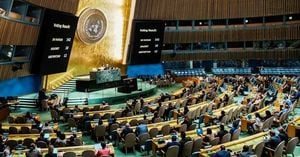The future of climate finance looms large as the world gathers for the 29th UN Climate Change Conference (COP29) taking place in Baku, Azerbaijan. With global leaders negotiating pressing issues, the call for increased financial support to combat climate change has never been more urgent.
At COP29, the Overseas Investors Chamber of Commerce and Industry (OICCI) emphasized the necessity of public-private partnerships as pivotal to addressing the pressing climate challenges faced by Pakistan. During their discussion titled ‘Unlocking Pakistan’s Climate Future with Public-Private Partnerships’ held at the Pakistan Pavilion, industry leaders and government representatives explored financing strategies aimed at enhancing climate resilience and fostering green investments. The conversation underscored the potential for partnerships between the private sector and government to drive sustainable development.
M. Abdul Aleem, Secretary General of OICCI, stressed the significance of private sector involvement, particularly as Pakistan wrestles with over $152 billion needed for climate adaptation. “Supportive policies and incentives are necessary to scale climate-smart investments,” he remarked, highlighting the role of regulatory frameworks in facilitating private financial commitments.
Supporting this viewpoint, Andrew Bailey, Managing Director at BASF Pakistan, pointed out how their members are striving for Net Zero targets. He confirmed, “OICCI members are advancing climate action through clean energy investments, green financing, and resilience efforts, turning climate action not just as responsibility but as opportunity.”
Nestlé Pakistan, through initiatives focusing on water regeneration, exemplifies the type of commitment required for sustainable business practices. Rob Cameron, Global Head of Environmental, Social, and Governance (ESG) Engagement at Nestlé, shared insights about their efforts to implement smart irrigation technologies across agricultural land, benefiting both productivity and the environment.
Further discussions included innovative financial instruments for promoting climate-smart agriculture. Veronica Nyhan Jones highlighted the role of thematic bonds such as green and blue finance. She argued, “Sustainability-linked financing can attract private capital, de-risk investments, and improve resilience—crucial for vulnerable regions. Addressing technical barriers is key to achieving this.” Her remarks emphasized the IFC’s commitment to aiding private sector finance through programs promoting sustainability.
Unilever's Global Sustainability Climate Lead Fiona Duggan reinforced the necessity for regulatory changes and financial incentives to promote circular economy practices. She posited, “Embedding climate resilience within supply chains creates broader, impactful contexts.” Her call for integrated approaches stressed the importance of collective efforts across industries.
Also at COP29, the Independent High-Level Expert Group on Climate Finance (IHLEGCF) unveiled findings shedding light on funding requirements for achieving the Paris Agreement's goals. They dropped the bombshell: wealthier nations need to amplify their climate finance contributions, more than doubling taxpayer-funded support by 2030. Currently, developing nations receive approximately $43 billion annually from developed countries, but estimates project they will need up to $100 billion per year to meet the commitment.
This significant financial leap is not just about public funds; private investments are also stressed, as half of the required $1 trillion should come from private capital. The IHLEGCF's co-chair, Professor Nick Stern, stated, “What’s necessary to deliver on Paris is to mobilize collective action.” Without immediate action, he warned of mounting pressures and costs as investment shortfalls accumulate.
Speaking to the potential fallout of lax financial contributions, the report cautioned against deferred investments, positing, “The less we achieve now, the more we need later.” The report concluded by emphasizing the need for immediate collaborative efforts, warning of intensifying climate risks, and advocating for multi-faceted investment strategies.
A sustainable path needs both immediate financial flows and visionary leadership. With the climate conference underway, world leaders are reminded of the weight their decisions carry—not just for the present but for future generations. Global coordination could determine whether we develop climate-resilient communities or face the consequences of delayed action.
With stakeholder voices echoing through the conference halls, the need for adequate financing to address climate change effectively remains clear. Rich nations are under pressure to fulfill their commitments made under the Paris Agreement, driving the point home: it’s time for substantive actions, not just promises.
Next steps involve detailed negotiations around finance agreements, and with every discussion held at COP29, the urgency amplifies. The goals laid out, if realized, could revolutionize global efforts to mitigate climate change's most devastating effects, creating the impetus for sustainable, resilient pathways forward. It’s this collective urgency and commitment to action through public-private partnerships and enhanced climate finance frameworks that'll shape our shared climate future.



